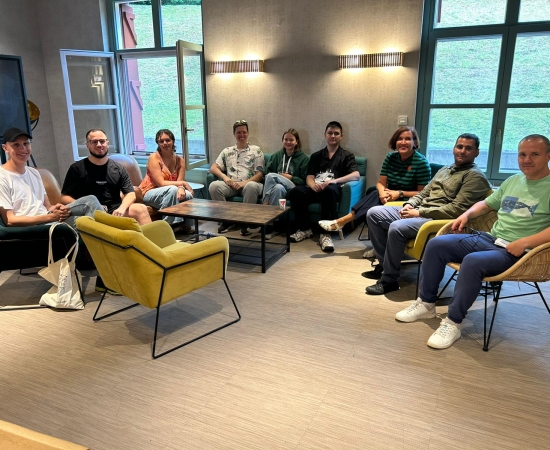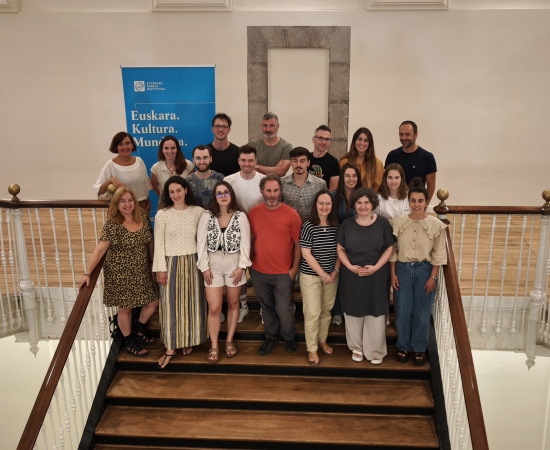Etxepare Basque Institute reinforces its commitment to Basque studies and Euskara in the USA
2025/08/01
Euskara. Kultura. Mundura.
Etxepare Basque Institute has signed several agreements this week in Boise to promote Basque studies and encourage Basque language teaching in the United States. On the one hand, Etxepare Basque Institute and Boise State University (BSU) have signed two cooperation agreements. On the other hand, Etxepare Basque Institute also signed a collaboration agreement with the North American Federation of Basque Organizations (NABO), which will be implemented as part of the Euskara Munduan programme, managed by the Etxepare Basque Institute since 2018.
The signing of the first two agreements took place on 31 July, at the end of the ZORTZIAK BAT symposium held by BSU. Present at the event were Ibone Bengoetxea, Deputy Prime Minister and Minister for Culture and Language Policy of the Basque Government; Irene Larraza, Director of the Etxepare Basque Institute; Marie-Anne de Graaff, Dean of the Faculty of Arts and Sciences at BSU; and Cara Greenlee, Director of Boise State University´s Office of Sponsored Programs. All parties reiterated their commitment to guaranteeing the presence and development of Basque studies at the university.
Pioneering research programme on Basque studies
The first of the agreements signed with Boise State University seeks to set up an ongoing groundbreaking research programme, the first of its kind to be promoted by the Etxepare Basque Institute at a university abroad. Although this programme, which is expected to begin in 2026, will be based in the Faculty of Arts and Sciences at BSU, Basque studies will be approached from a multidisciplinary perspective, involving various departments across the university.
The programme will offer research opportunities to undergraduate and graduate students, as well as providing teaching staff with the chance to conduct research projects. Cooperation with universities in the Basque Country will be encouraged, and channels will be established to facilitate research activities. Academic events focusing on Basque culture, language, history, and society, such as conferences, symposiums, and seminars, will be promoted, as will efforts to disseminate research findings.
Commitment to the future of the Eloise Garmendia Bieter Chair
The second agreement aims to give continuity to the Eloise Garmendia Bieter Chair in Basque Studies. Funded by the Etxepare Basque Institute and developed in collaboration with BSU, the programme annually invites a renowned teacher or lecturer to conduct teaching or research activities related to Basque studies. The invited instructor delivers classes, seminars, and lectures to postgraduate and doctoral students, helping to expand knowledge and academic research on Basque issues through their contribution. The Boise Basque community is also involved, with the guests conducting outreach activities alongside them.
Bolstering Euskara at the Euskal Etxeak Basque centres in the U.S.
The collaboration agreement signed with the NABO federation took place on 1 August, in a ceremony wherein the Lehendakari Imanol Pradales took part. The agreement´s aim is to promote and consolidate the teaching of Euskara in Basque centres in the United States. This agreement is part of the Euskara Munduan programme, managed by Etxepare since 2018. Euskara Munduan was created to promote knowledge of the Basque language among Basque communities worldwide and to facilitate its transmission to new generations.
The aim of the agreement is twofold. First, to transfer and adapt to the United States the model developed successfully in Argentina, where people from the Basque communities themselves learn Basque and are trained as teachers to give classes in their respective Euskal Etxeak centres. In addition to learning the language, they receive specialised didactic training and teaching materials, enabling the Euskal Etxeak to independently offer courses without relying on teachers from the Basque Country. The second aim is to increase the number of Euskal Etxeak in the United States that can offer Basque classes to their communities, whether in person, online or hybrid. To achieve this, the Etxepare Basque Institute will strengthen its institutional and pedagogical support, increase funding for Basque classes, and enhance the training of local teachers. This approach will ensure high-quality instruction that is tailored to the specific realities and needs of the U.S. context.




